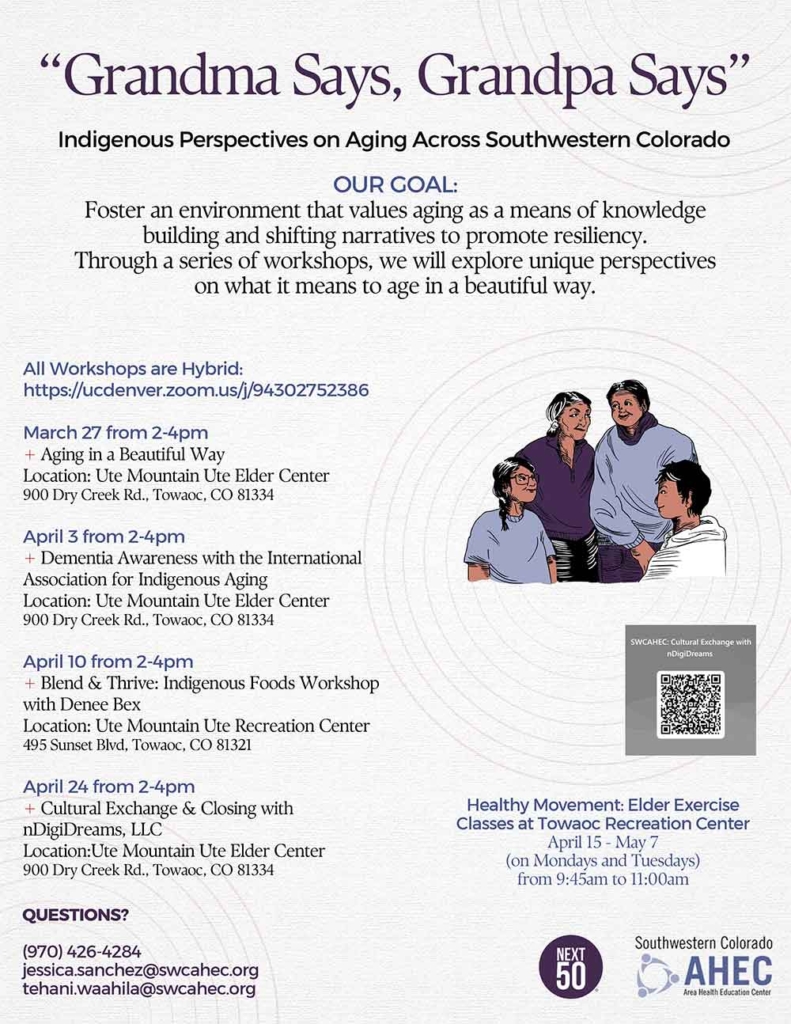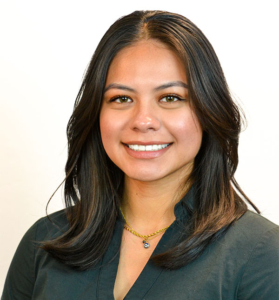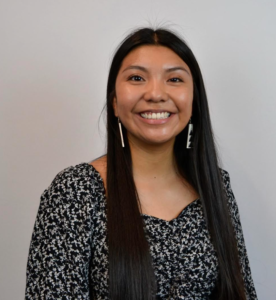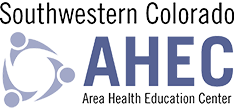A Next 50 Funded Program
Redefining Aging within Indigenous Communities
We’re excited to share the enriching journey of the workshop series, “Grandma Says, Grandpa Says,” made possible by the Next 50 funded program. Led by Tehani Waahila and Jessica Sanchez, their aim was to redefine aging within Indigenous communities, spotlighting the resilience and strength inherent in Native Elders of the Ute Mountain Ute tribe.
In their inaugural session, a dozen participants engaged in heartfelt discussions about the significance of aging, sharing personal anecdotes and reflecting on the profound teachings passed down by elders. Despite initial hesitations, the room soon overflowed with poignant narratives, underscoring the deep intergenerational connections. Tehani and Dyllon Mills cherished the opportunity to connect with participants, deeply moved by their shared life experiences.
Teaming up with the International Association for Indigenous Aging (IASquared) for their second workshop, a guest speaker delved into the complexities of health, with a special focus on dementia awareness. Through interactive activities and discussions, attendees explored strategies for healthy living and learned about dementia risk reduction. The session concluded with a spirited round of Dementia Bingo, engaging participants and enhancing the overall workshop experience.
In the “Blend and Thrive: Indigenous Foods Workshop” with Denee Bex, fifteen participants were empowered to explore the nutritional benefits of indigenous ingredients and discover how to incorporate them into delicious, nourishing meals. From nutritional discussions to hands-on cooking experiences, attendees uncovered the transformative potential of traditional foods, buoyed by the encouragement of Jessica and Chelsie Begoody.
The final installment, “Cultural Exchange & Closing” workshop with nDigiDreams, provided an enriching experience of storytelling and creative expression. Participants shared their stories, celebrated their cultural heritage, and strengthened community bonds. Carmella Rodriguez and Brenda Manuelio offered an inspiring presentation on the cultural perspectives on aging across different tribes. Discussions flowed in a group circle, ranging from spiritual tales to personal anecdotes, leaving the ten participants with newfound perspectives on aging.
Through these workshops, the goal was to honor the wisdom of Native Elders, foster intergenerational connections, and promote holistic well-being within Indigenous communities.

Workshop Series

Indigenous Aging Resource

The Idea Behind the Workshops and the Amazing Women
Who Created and Facilitated the Program
Jessica and Tehani developed the idea for these workshops through respectful brainstorming sessions, carefully considering the boundaries of the elders they aimed to serve despite their own younger age. They focused on teaching methods for maintaining health while creating a bond that dismantled stigmas surrounding aging, deliberately steering away from emphasizing the end of life as a focal point throughout their planning process.

Tehani Waahila was born and raised on the Big Island of Hawaii and is a member of the Navajo Nation. Tehani’s journey led her to Durango, Colorado, where she pursued a Business Administration degree at Fort Lewis College. Though her academic background is in business, her heart found its true calling in the field of public health. She discovered SWCAHEC shortly after. Tehani seeks to be a catalyst for change striving to create a more equitable environment for underserved populations and become a beacon of inspiration for those she serves.
Ahéhee’ & Mahalo”

Jessica Sanchez (she/her) is from Santo Domingo Pueblo and a member of the Navajo Nation. She graduated from Fort Lewis College with a Bachelor of Arts in Public Health and minor in Chemistry. Jessica plans on continuing her education by pursuing a graduate degree with a focus on Public Health. With her interest in achieving health equity and addressing disparities apparent within marginalized communities, she would like to continue work toward advocating for the health of future generations.

